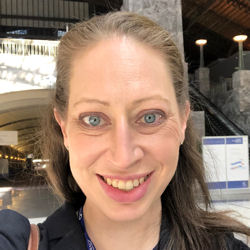
Avital Y O’Glasser, MD, FACP, FHM
Associate Professor of Medicine in the Department of Medicine and Department of Anesthesiology and Perioperative Medicine, Oregon Health & Science University
Preoperative Medicine Clinic Medical Director
Assistant Program Director for Social Media and Scholarship, Oregon Health & Science University internal medicine residency program
ACP Council of Early Career Physicians
— MEDICAL SCHOOL —
Jefferson Medical College
— INTERNAL MEDICINE RESIDENCY —
Oregon Health & Science University
What is your current position?
Associate Professor of Medicine in the Department of Medicine and Department of Anesthesiology and Perioperative Medicine, Oregon Health & Science University
Preoperative Medicine Clinic Medical Director
Assistant Program Director for Social Media and Scholarship, Oregon Health & Science University internal medicine residency program
ACP Council of Early Career Physicians
Where did you attend medical school and postgrad training?
Medical School—Jefferson Medical College
Residency—Oregon Health & Science University
Why did you choose to become a physician?
I actually didn't see myself becoming a physician when I started college! I entered college pursuing a lifelong dream of becoming a paleontologist. However, between fantastic biology plus humanities professors in college, as well as work and volunteer experiences, I realized that my true passions lay in applying the sciences to directly caring for and helping people as a physician.
What field of internal medicine did you select and why?
I currently specialize in perioperative medicine as a hospitalist, so I say that I'm an outpatient hospitalist! A lot of serendipity and well-timed mentorship led to this career pathway. When I finished residency, I was applying for hepatology fellowship and about to take a gap year as an academic hospitalist. I didn't match for fellowship, but I discovered my passion for academic hospital medicine. I also worked part time in preop clinic that year to help fill in, and I was immediately hooked! For me, perioperative medicine has let me take care of very complex patients at pivotal crossroads in their lives along with a multidisciplinary team of surgeons and anesthesiologists. I love the types of connections and relationships this niche within internal medicine has let me develop over the years.
Please describe a typical day in your practice.
I see patients in preop clinic just over half my time. When I'm in clinic, I see a full day's worth of preoperative consult visits. During the last year and a half, I have been either in clinic or campus or completing telehealth visits by telecommuting from home. As I'm our preop clinic's medical director, I also work closely and make myself available for questions from our team members (other physicians, NPs, RNs, MAs). When I'm not seeing patients, I'm attending meetings or working on projects for our clinic (especially with all the new innovations and pathways we've had to develop during the COVID-19 pandemic) or the internal medicine residency program. I also make time for creative projects, such as research, writing, and creating lectures about perioperative medicine or other topics.
What are some of your special interests professionally?
I am passionate about perioperative medicine, and I have spent a lot of time in the last year studying how to safely care for COVID-19 survivors who need surgery. Outside of this clinical interest area, I am very interested in analyzing and teaching effective use of social media (particularly Twitter) for health professionals. I am passionate about promoting clinician-led advocacy. I am also very interested in helping clinicians and trainees capture the value and impact of their “nontraditional” work such as digital scholarship and advocacy, through “traditional” communication means like CVs and applications.
What are your interests and hobbies outside of medicine?
I love spending time with my family, including two young sons and our labradoodle Matilda. As a family, we've explored hiking, gardening, and cooking, especially during the pandemic. I am an amateur genealogy buff (the internist in me comes out when I'm in detective mode!), knitting, and reading.
What advice would you like to share with medical students, or what do you wish someone would have told you while you were in medical school?
I wish I had been more aware of the challenges gender inequity and other forms of inequity and discrimination during my training—I want any trainee (or anyone in practice) to know that there are people out there advocating for change and mentors/sponsors out there who want to help them navigate these challenges so they can excel.
If you could change one thing about yourself, what would it be?
I wish I was less afraid of failure. I feel like I've come a long way in this regard over the years, but I think there are times I might have taken more chances in life or done something more daring if fear of failure or fear of disappointing others wasn't holding me back.
What is you most treasured possession?
I still have the teddy bear I've had since I was 1 year old!
What historical figure do you most identify with?
Not that I necessarily identify with her, but I'm fascinated by the life and work of Mary Anning. She was a fossil hunter in Britain in the early 1800s who made major discoveries but was excluded from the scientific community. She's the basis for the rhyme “She sells seashells by the seashore.”
What is your motto?
It's okay to say, “I don't know.” Being able to find and foster safe spaces and relationships to admit uncertainty in life and medicine is a crucial step towards cultivating growth mindset.
Back to the August 2021 issue of ACP IMpact
More I.M. Internal Medicine Profiles

